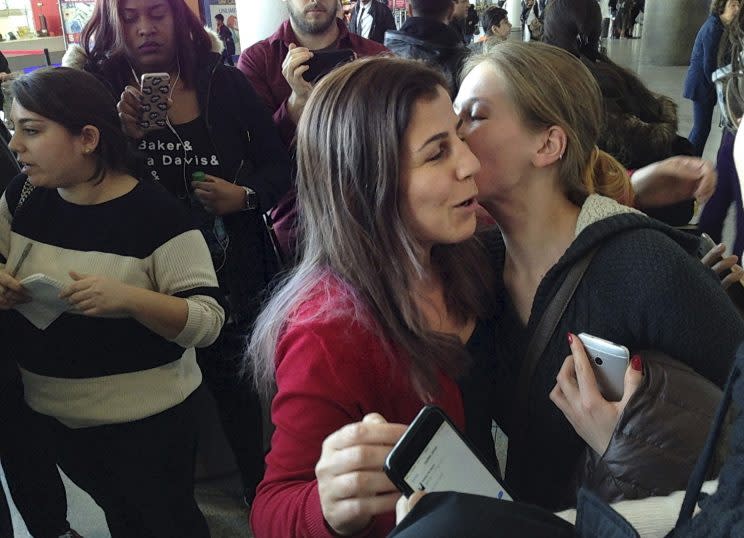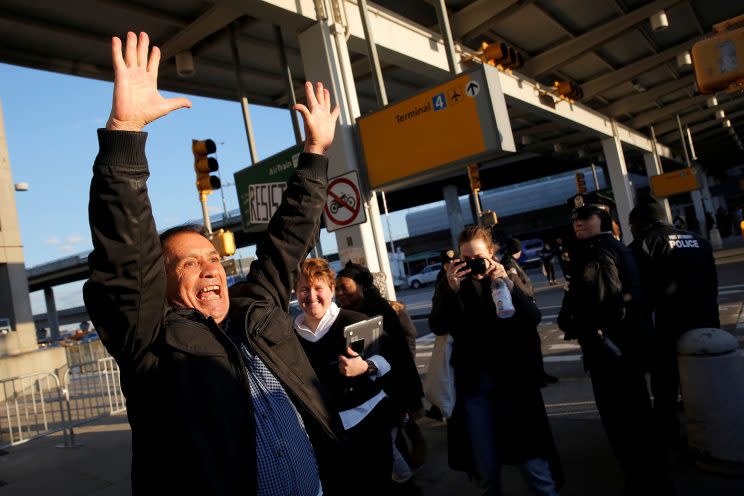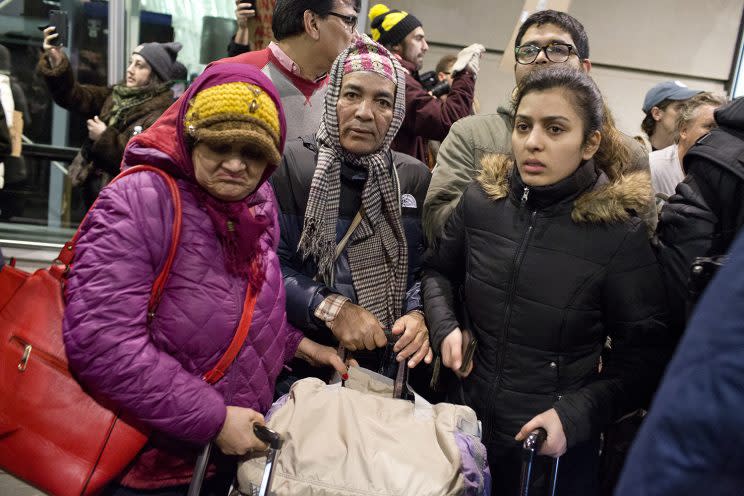Final refugee families enter U.S. after Trump’s immigration ban

As Uncle Sam closed his doors to many immigrants, the final refugees to enter the United States were greeted with welcome placards and cheers at airports throughout the country.
On Jan. 27, President Trump signed an executive order that for at least 90 days halts immigration from seven majority-Muslim countries: Iraq, Iran, Libya, Somalia, Sudan, Syria and Yemen. The populist president also suspended the entire U.S. refugee program for 120 days.
Danielle Stamos, a spokesperson for Catholic Community Services of Utah, said Trump’s executive order affected thousands of refugees who were just about to come to the U.S. to start their new lives.
“We’re very disappointed, deeply concerned about what that means for the thousands of people who deserve a happy life and a future,” Stamos told Yahoo News. “We have the capacity and the ability to take care of so many more people and help them on their journey to become self-sufficient and have the freedom they never would have had in their refugee camp.”
On Tuesday, Kevin McAleenan, the acting commissioner of the U.S. Customs and Border Protection agency, announced that despite Trump’s ban, waivers permitting entry for 872 additional refugees would be issued. He said these refugees had already prepared for their trip the U.S. and canceling at this point would create “undue hardship.”
While the commander in chief went about his day, which included another Twitter argument with action movie star Arnold Schwarzenegger, refugees were celebrating their first moments in the United States — far from the warfare they left behind in the Middle East and Africa.
Catholic Community Services of Utah sponsored an Afghan family of seven that landed Thursday at Salt Lake City International Airport, where they were welcomed to the United States by roughly 300 people with balloons and signs.
“It was supposed to be a family of eight. However, their grandmother was detained in Istanbul,” Stamos said. “That was quite a blow for us and the family.”

The Salt Lake Tribune reported that Hassan Barat Ali Hassan, Fozia Ramazan Ali Qurban Ali and their five children fled the Afghan war a few years ago by crossing the border into Pakistan, where they had been living in a refugee camp. Before the family arrived in Utah, the crowd sang verses of folk singer Woody Guthrie’s “This Land Is Your Land.”
“This is the first time in our lives we have been welcomed,” Ali Hassan told the Salt Lake Tribune through an interpreter. “You are so kind and nice.”
On Wednesday, a pair of Congolese sisters, Geogette and Edwina, who fled civil war in their native country for Zambia — where they spent 18 years in a refugee camp — landed at Chicago’s O’Hare International Airport.
The Chicago Tribune reported on the roughly two dozen volunteers from the local church and synagogue that jointly sponsored the women’s application for resettlement. They brought balloons, flowers and winter coats for the sisters, who arrived with just one piece of luggage.
“We are happy,” Geogette told the paper. “We want to look for a job and school.”

Idaho-based ABC affiliate KIVI spoke with Devin Rugema, a refugee from war-torn Burundi in East Africa, about his life in a refugee camp.
“At the camp, … some people are killed — and we heard rumors that people came to attack the camp were the people from the government of Congo,” he said.
Rugema said he’s grateful to now live in Idaho’s capital city of Boise where he’s been reunited with his mother, sister and brother
“I like it very much,” he told KIVI. “Boise, so far, I love it.”
According to the Pew Research Center, 85,000 refugees entered the United States in the 2016 fiscal year and 46 percent of those (38,901) were Muslim.
Trump supporters argue that the executive order on immigration is an appropriate response to the threat of jihadis. They often express fear that terrorists are slipping into Western countries under the guise of refugees seeking asylum. During the campaign, Trump argued that Syrian refugees, in particular, were perhaps part of an Islamic State “plot” to launch what he said “could be one of the great military coups of all time.” His executive order halts all Syrian refugees indefinitely.
The new administration’s mandates have also incited widespread unrest and protest, including large rallies at airports where refugees in transit were detained for hours following Trump’s order.
Critics of the ban often point to darker chapters of American history, such as the choice to turn away Jewish refugees fleeing Nazi Germany, to argue that the country should not display similar callousness as Syrians seek a haven from their protracted and multifaceted civil war.
Read more from Yahoo News:



